Best Blog Platform for Affiliate Marketing:
In 2025, affiliate marketers are on the lookout for top-notch blogging platforms that meld ease of use with robust features to maximize audience engagement and revenue.

Our curated list of the top 5 platforms caters to a spectrum of needs, from WordPress’s extensive customization to Squarespace’s design elegance, and from Wix’s user-friendly interface to Shopify’s e-commerce integration, ending with HubSpot CMS Hub’s all-encompassing marketing tools.
What is the Best Blog Platform for Affiliate Marketing?
Embarking on the quest for the ultimate blog platform for affiliate marketing in 2025 is not just about finding a place to host content—it’s about discovering a launchpad that propels your affiliate goals to new heights.
- WordPress: Unleash your full creative and entrepreneurial spirit with WordPress. Its boundless customization and potent SEO plugins will be your secret weapon in the cutthroat world of affiliate marketing.
- Squarespace: Envision your brand wrapped in sophistication with Squarespace. It’s where elegance meets efficacy, giving your affiliate endeavors a home that’s as visually stunning as it is conversion-focused.
- Wix: Launch into the market with Wix’s stunning ease-of-use. This platform is your fast track to an online presence that’s as attractive as it is functional.
- Shopify: Elevate your affiliate prowess with Shopify’s e-commerce mastery. If your vision blends content with commerce, Shopify offers an arsenal of tools to monetize your influence seamlessly.
- HubSpot CMS Hub: Step into the ring with a heavyweight—HubSpot CMS Hub. For those ready to go beyond mere content, HubSpot is the cornerstone of a strategy woven with the threads of content, marketing, and sales.
1. WordPress
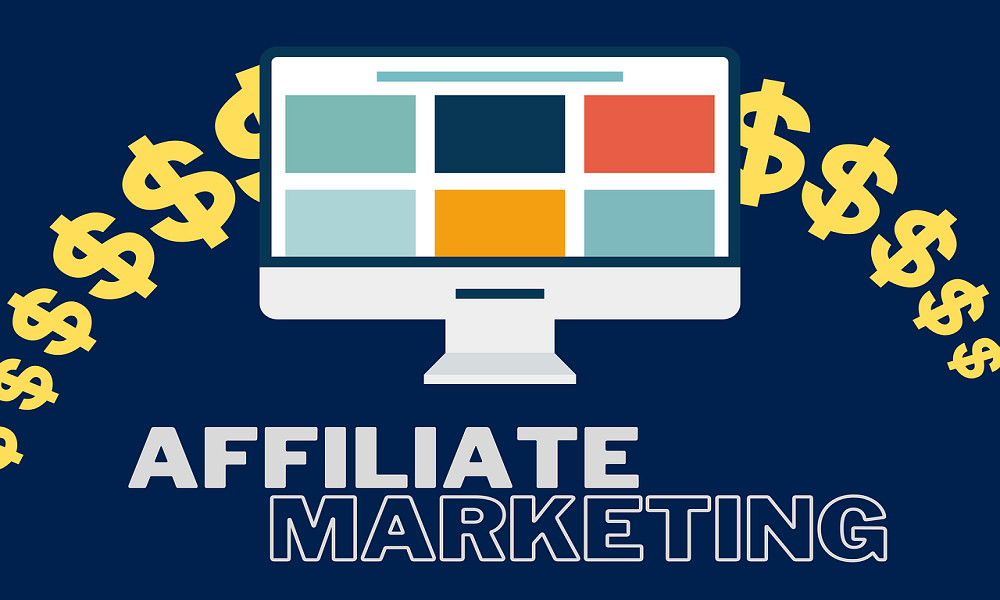
Are you on the hunt for the best blog platform for affiliate marketing? Look no further than WordPress. With unparalleled flexibility and a host of powerful features, it’s the go-to choice for affiliate marketers worldwide.
Ryan’s Advice on WordPress: “As an affiliate marketer, harnessing the power of WordPress’s plugins like Akismet for anti-spam and WooCommerce for e-commerce can significantly enhance your site,” says Ryan, an affiliate marketing expert.
Key Features of WordPress for Affiliate Marketing:
- Extensive Plugin Ecosystem: Customize your site with plugins for SEO, affiliate links, and more.
- Customizable Themes: Select from thousands of themes to match your brand’s style.
- User-Friendliness: WordPress offers an intuitive interface with a gentle learning curve.
- Affiliate Marketing Features: WordPress plugins specifically cater to affiliate marketers.
- SEO-Friendly: Its SEO-friendly nature ensures websites rank higher on search engines.
- E-commerce Support: Integration with WooCommerce allows for the creation of a powerful online store.
- Multilingual Support: WordPress supports numerous languages, facilitating global reach.
- Community and Support: A vast community and numerous resources offer support and insights.
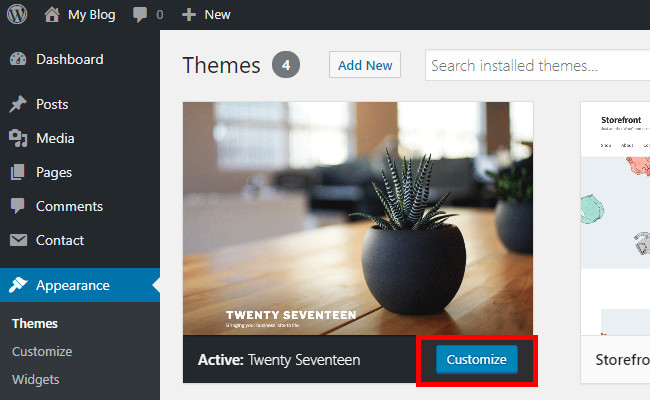
Who Should Choose WordPress:
- Content Creators: Bloggers who focus on creating quality content.
- SEO Enthusiasts: Marketers who want to rank well on search engines.
- E-commerce Integrators: Anyone looking to add e-commerce functionality.
Ideal Use Cases for WordPress:
- High-Traffic Blogs: WordPress can handle the demands of a growing audience.
- Diverse Affiliate Programs: Manage various affiliate programs seamlessly.
- Custom Content Needs: Tailor your content strategy with custom post types.
User Experiences and Case Studies:
Many affiliate marketers have carved out successful niches using WordPress. Case studies from bloggers in diverse industries reveal WordPress’s flexibility and efficiency in driving sales and engagement.
WordPress Pricing Structure:
WordPress.org is free.
But costs can include hosting, domain registration, premium themes/plugins, and developer fees if necessary. Overall pricing is generally competitive, especially considering the level of customization it offers.
- Initial Costs: Domain name (~$10-15/year) and hosting (starting at $2.95/month).
- Optional Expenses: Premium themes and plugins can add additional costs.
Pros and Cons of WordPress:
- Pros: Highly customizable, large community support, great for SEO.
- Cons: Requires a learning curve, ongoing maintenance.
How to Select the Best Blog Platform: Ryan’s Guide:
- Ease of Use: Consider the learning curve and user interface.
- Customization: Look at themes, plugins, and development flexibility.
- Security: Assess built-in security features and update frequency.
- Support and Community: Ensure robust community and support availability.
- Cost: Compare initial and ongoing costs, including hosting and add-ons.
WordPress Versus Other Platforms:
- Customization: More than other platforms, WordPress offers deep customization.
- Control: You have full ownership and control over your WordPress site, unlike hosted platforms.
Getting Started with WordPress:
- Step 1: Purchase a domain name and select a hosting provider.
- Step 2: Install WordPress, either manually or through a one-click installer provided by many hosts.
Why Try WordPress for Affiliate Marketing:
WordPress is a powerhouse for affiliate marketers, combining ease of use with a suite of powerful tools designed to enhance your marketing efforts. Give WordPress a try, and you’ll quickly see why it’s the preferred choice of professionals in the field.
2. Squarespace

Squarespace stands out as a potential best blog platform for affiliate marketing due to its elegant, responsive templates, intuitive drag-and-drop interface, and robust SEO tools that are essential for affiliate marketing.
Ryan’s Advice on Using Squarespace for Affiliate Marketing
Tech expert Ryan endorses Squarespace for those asking, “Is Squarespace the best blog platform for affiliate marketing?” He highlights its user-friendly design and integrated marketing tools that can be a boon for affiliate marketing professionals.
Key Features
- Beautiful designer templates that are responsive and customizable
- Powerful and intuitive website editor
- Comprehensive SEO tools
- Integrated analytics
- E-commerce capabilities with multiple payment options
- 24/7 customer support
- SSL certificates for enhanced security
Squarespace: A Strong Contender for Best Blog Platform for Affiliate Marketing
In this Squarespace review, the platform is highlighted as potentially the best blog platform for affiliate marketing, especially for those who value aesthetics and ease of management without needing extensive customization.
Squarespace as an Ideal Platform for Affiliate Marketing
Squarespace fits the bill for affiliate marketers looking for a high-quality blog platform that combines ease of use with sophisticated design capabilities.
Best For
Squarespace is best for users who are looking for:
- Ease of Use: A drag-and-drop interface makes website building straightforward.
- Design Quality: Access to award-winning templates.
- All-in-One Solution: Hosting, domain names, and a suite of tools are included.
Ideal for
The platform is ideal for:
- Creative Professionals: Photographers, artists, and designers can showcase their portfolios with stunning visuals.
- Small Business Owners: Squarespace’s e-commerce solutions and professional templates are suited for small to mid-sized businesses.
- Bloggers: With impressive blogging tools and layouts, bloggers can create compelling content.
User Experiences: Squarespace for Affiliate Marketing Success Stories

Affiliate marketers praise Squarespace for its streamlined workflow and stylish designs, which have proven to increase engagement and, consequently, affiliate marketing sales. This section could be enhanced with real-life success stories and accompanying images of affiliate marketing blogs hosted on Squarespace.
Squarespace Pricing for Affiliate Marketers
Squarespace offers several pricing tiers, ranging from basic websites to advanced e-commerce plans. While not the cheapest option, its all-inclusive pricing means users won’t have to worry about additional costs for hosting or security features.
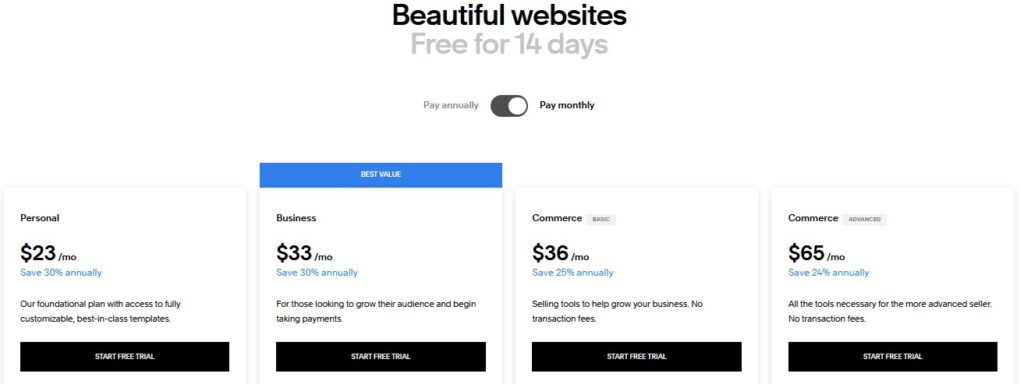
Pros and Cons from a Squarespace Review for Affiliate Marketing
Pros:
- Design Excellence: Critical for affiliate marketing sites looking to attract and retain visitors.
- Integrated Marketing Tools: Essential for tracking affiliate marketing metrics.
- Reliable Support: Round-the-clock customer support to assist affiliate marketers.
Cons:
- Higher Cost: May not be the best blog platform for affiliate marketing for those on a tight budget.
- Limited Customization: While often sufficient, it might not satisfy all affiliate marketing strategies.
- Challenging to Migrate: Switching from Squarespace can be tricky, which might concern affiliate marketers who like to experiment with different platforms.
Criteria for Selecting the Best Platforms: Buyer’s Guide
When selecting a website builder:
- Design Needs: Evaluate the quality and range of templates.
- Functionality: Look for the required features and tools.
- Ease of Use: Consider the learning curve for new users.
- Budget: Determine the total cost including any add-ons or transaction fees.
- Support: Ensure there is adequate customer support.
Detailed Comparison in Squarespace Review for Affiliate Marketers
When comparing Squarespace to other contenders for the title of best blog platform for affiliate marketing, such as WordPress or Wix, Squarespace stands out for its design quality and simplicity.
Get Started with Squarespace
- Visit the Squarespace website.
- Select a plan that suits your needs.
- Begin the design process using their intuitive templates.
- Take advantage of their guided setup to launch your site quickly.
3.Wix

Wix to determine if it indeed stands as the best blog platform for affiliate marketing.? When it comes to affiliate marketing, the choice of your blogging platform can be a decisive factor in your success. In this in-depth review, we evaluate. Let’s dive in.
Ryan’s Advice for Affiliate Marketers Using Wix
Ryan, a seasoned affiliate marketer, advises that Wix’s seamless integration of affiliate links and its reliable uptime make it a top contender for the best blog platform for affiliate marketing. He suggests maximizing the use of Wix’s analytical tools to track and optimize your marketing efforts.
Key Features of Wix for Affiliate Marketers
- Drag-and-drop interface for easy content management
- SEO optimization tools for improved search rankings
- Customizable templates for affiliate marketing campaigns
- Integration capabilities with affiliate tracking tools
- Mobile optimization to ensure content looks great on all devices
- Robust analytics to track and measure campaign performance
- 24/7 customer support for any technical needs or questions
Best For
Wix is best for freelancers, small business owners, bloggers, and personal website enthusiasts who prioritize ease of use and design over the granular control a developer might require.
Ideal for Creatives and Entrepreneurs
The combination of Wix’s intuitive design capabilities and expansive app integration makes it ideal for creatives and entrepreneurs looking to craft an online space that’s both aesthetic and functional without delving into code.
User Experiences: Thriving with Wix as the Best Blog Platform for Affiliate Marketing

Case studies reveal that many affiliate marketers find Wix to be the best blog platform for affiliate marketing due to its blend of functionality and ease of use.
Pricing: Does Wix Justify Its Cost?
Wix offers a tiered pricing structure, which caters to different budgets and needs.
Website Plans: Great for showcasing a professional site
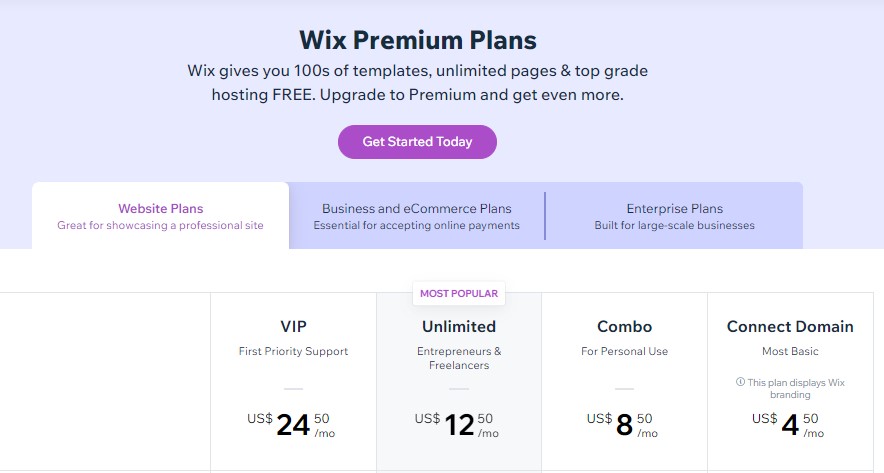
Business and eCommerce Plans: Essential for accepting online payments
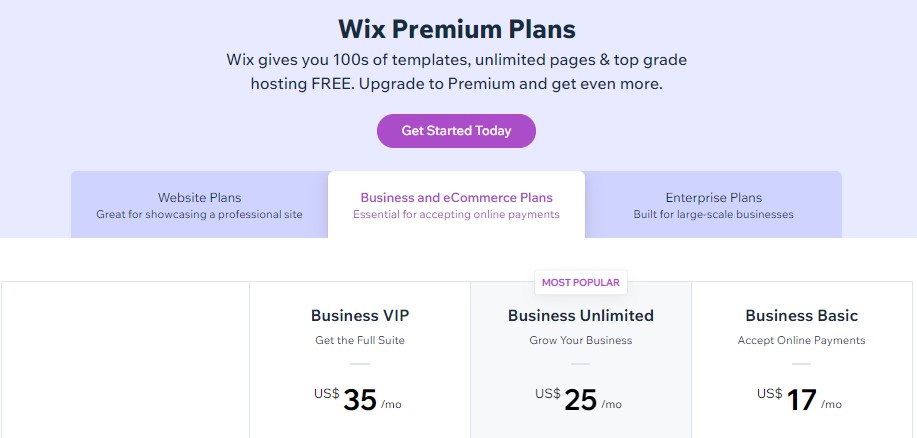
Enterprise Plans: Built for large-scale businesses
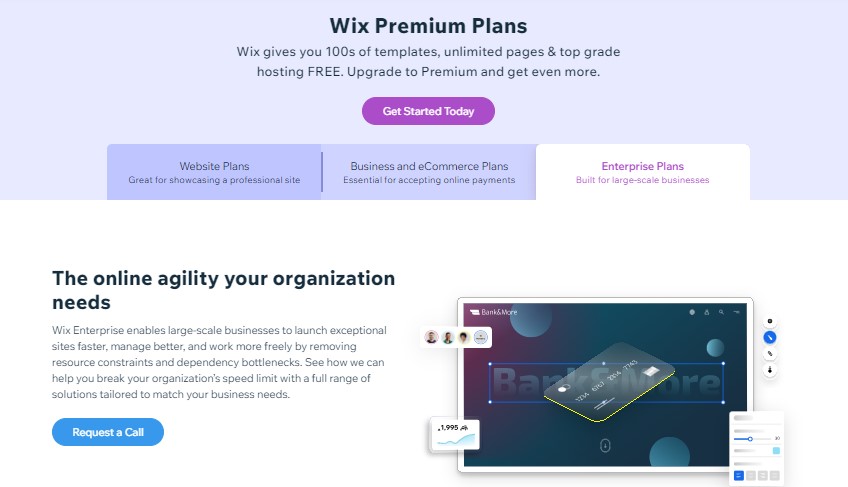
While the free version comes with Wix branding, premium plans offer more storage, bandwidth, and advanced features like e-commerce capabilities.
Pros and Cons of Wix
Pros:
- User-Friendly: Wix’s interface is perfect for non-technical users.
- Design Rich: The template selection is diverse and professionally designed.
- Flexibility: The App Market adds layers of functionality.
Cons:
- Price Scaling: As your site grows, so can the cost significantly.
- Template Lock: Once you choose a template, you cannot switch without rebuilding your site.
- SEO Limitations: While improved, Wix’s SEO features may not satisfy all advanced requirements.
Selecting the Best Platform: A Buyer’s Guide
When considering Wix, weigh the balance between ease of use, design quality, and specific features against the potential long-term costs and SEO needs of your project.
Detailed Comparison
Wix often stands out as the best platform for users who value design and ease of use, but it may fall short for those who require advanced SEO tools and extensive customization that platforms like WordPress offer.
Get Started with Wix – The Best Blog Platform for Affiliate Marketing
Embarking on the Wix journey is simple. Navigate to their site, choose your preferred plan, and let Wix’s interface guide you through the process of creating and customizing your website, from template selection to going live.
- Step 1: Visit Wix.com
- Step 2: Choose Your Preferred Plan
- Step 3: Select a Template
- Step 4: Customize Your Site
- Step 5: Publish and Go Live
Is Wix the Best Platform for You?
As this in-depth review concludes, Wix is a formidable contender for the title of the best platform for those valuing design and user experience above all.
4. Shopify

In the search for the best blog platform for affiliate marketing, Shopify has emerged as a front-runner for entrepreneurs and bloggers who are looking to monetize their content through e-commerce.
Ryan’s Advice for Affiliate Marketers Using Shopify
Expert Ryanshody suggests maximizing Shopify’s built-in SEO tools to attract more organic traffic—a key component for a successful affiliate marketing strategy.
Key Features of Shopify for Affiliate Marketing
- Seamless integration with leading affiliate tracking software
- Customizable and professional-looking storefront designs
- Robust and secure e-commerce platform for selling products
- Efficient management of affiliate products and orders
- Extensive app marketplace for additional functionality
- Excellent customer support and resources for merchants
- Analytics and reporting tools to track affiliate success
Best For: Affiliate Marketers Looking for Scalability
As the best blog platform for affiliate marketing, Shopify’s infrastructure is designed to handle growth, meaning affiliate marketers can start small and expand without switching platforms.
Ideal for: Bloggers and Influencers
Bloggers and social media influencers will find Shopify’s interface and marketing tools to be a perfect match for their affiliate marketing endeavors.
User Experiences and Case Studies in Affiliate Marketing

Numerous Shopify users have leveraged the platform for affiliate marketing, citing its ease of use and excellent support in their success stories.
Pricing: Investment for Your Affiliate Marketing Business
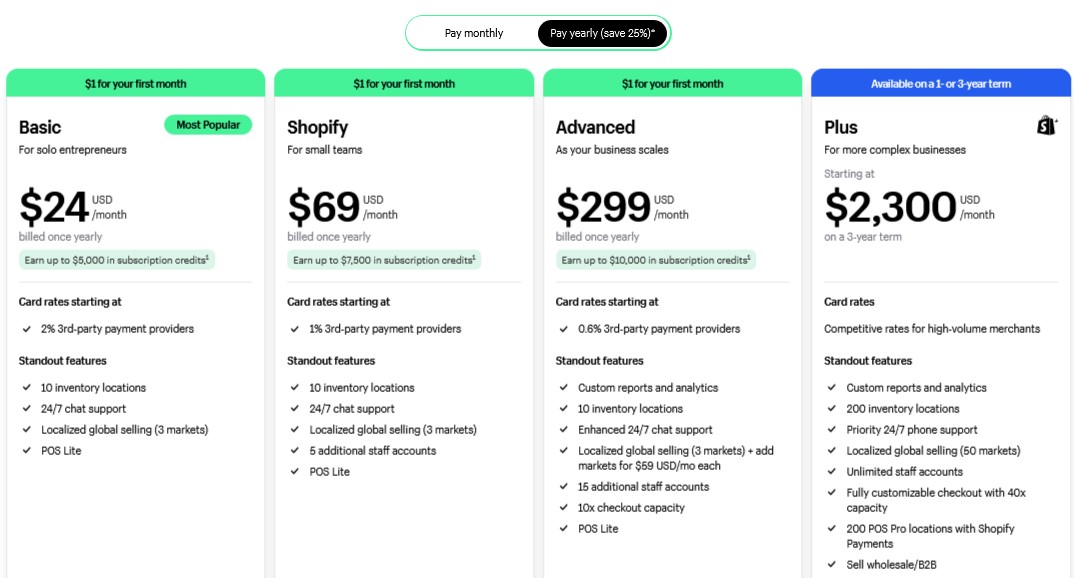
While Shopify may not be the cheapest option, its range of features makes it a valuable investment for those serious about affiliate marketing.
Pros and Cons for Affiliate Marketers
Pros:
- High customization potential for affiliate storefronts
- Robust analytics to track affiliate sales
Cons:
- Monthly fees on top of affiliate marketing expenses
- A steeper learning curve for those new to e-commerce
Criteria for Selecting the Best Blog Platform for Affiliate Marketing
Choosing the best blog platform for affiliate marketing depends on factors such as ease of use, SEO capabilities, integration with affiliate networks, and scalability—all areas where Shopify excels.
Detailed Comparison: Shopify for Affiliate Marketers
Shopify outshines other platforms when it comes to e-commerce features, but those focused purely on content may prefer platforms with stronger blogging tools.
Get Started with Shopify: Your Affiliate Marketing Platform Choice
Shopify Setup Guide
- Sign Up: Create an account on Shopify’s website to get started with a free trial.
- Customize Your Store: Choose a theme and customize it to fit your brand and products.
- Add Products: Upload product details, photos, descriptions, and prices.
- Get a Domain: Purchase or connect a domain to establish your online store’s address.
- Set Up Payments: Integrate various payment options for your customers.
- Figure Out Shipping: Configure your shipping options and rates.
- Test Everything: Place a test order to ensure all processes are functioning correctly.
- Launch: Open your store to the public by removing the password protection.
- Market Your Store: Use digital marketing strategies to draw traffic to your store.
- Check Progress: Utilize Shopify’s analytics tools to monitor and improve your store’s performance.
- Keep Improving: Continuously update and refine your store based on customer feedback and sales data.
For those in affiliate marketing, getting started with Shopify could be the first step towards a lucrative blogging career.
Final Thoughts on Shopify as the Best Blog Platform for Affiliate Marketing
Shopify’s robust features, scalability, and strong support network make it the best blog platform for affiliate marketing for those looking to integrate a strong selling platform with their content.
5. HubSpot CMS Hub

HubSpot CMS Hub stands out as a best blog platform for affiliate marketing due to its all-in-one marketing toolkit. From SEO tools that help your affiliate content rank higher in search results to personalized call-to-action buttons that increase conversion rates.
Ryan’s Advice for Affiliate Marketers Using HubSpot CMS Hub
Ryan, a seasoned affiliate marketer, recommends the following when using HubSpot CMS Hub:
- Leverage Analytics: Use HubSpot’s analytics to understand your audience deeply and cater to their interests.
- Content Is Key: Consistently produce high-quality content that provides value and drives traffic.
- SEO Best Practices: Stay updated with SEO trends and apply best practices to ensure your content ranks well.
- Utilize CRM Features: Make full use of the CRM to track customer interactions and tailor your marketing efforts.
- Automate Wisely: Implement automation in a way that personalizes the user experience, not detracts from it.
Key Features:
- Integrated SEO tools to maximize visibility for affiliate content.
- Customizable call-to-action buttons to enhance user engagement and conversions.
- Responsive and mobile-optimized templates to reach audiences on any device.
- Lead tracking and management to nurture and convert prospects effectively.
- Content personalization options to deliver tailored experiences to visitors.
- Comprehensive analytics to gauge the performance of marketing efforts.
- Advanced security features to protect both the website and user data.
Best For: Affiliate Marketers Looking to Use HubSpot CMS Hub
- SEO Optimization: Integrated SEO tools enhance your content’s visibility.
- Customization: Personalize user experiences to boost conversion rates.
- Analytics: Measure your success and tweak your strategies accordingly.
- CRM Integration: Keep track of your leads and manage relationships effortlessly.
- Content Management: Easily create and manage your content to engage your audience.
- Marketing Automation: Save time with automated marketing tasks, focusing more on content and strategy.
Ideal for:
This platform is ideal for affiliate marketers who need a comprehensive solution for managing their marketing funnel. Whether you’re a solo entrepreneur or a large marketing team, HubSpot CMS Hub offers scalability as one of the best blog platforms for affiliate marketing.
User Experiences and Case Studies:
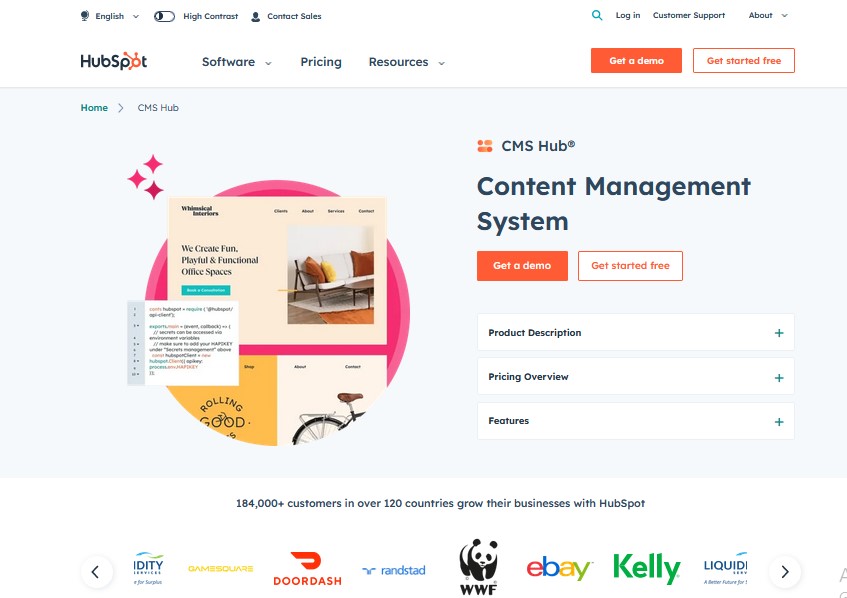
Case studies of successful affiliate marketers underscore the effectiveness of HubSpot CMS Hub as a best blog platform for affiliate marketing. Users often praise the platform’s integrations with CRM systems and analytics, providing deep insights into affiliate campaign performance.
Pricing:
Individuals & Small Teams:
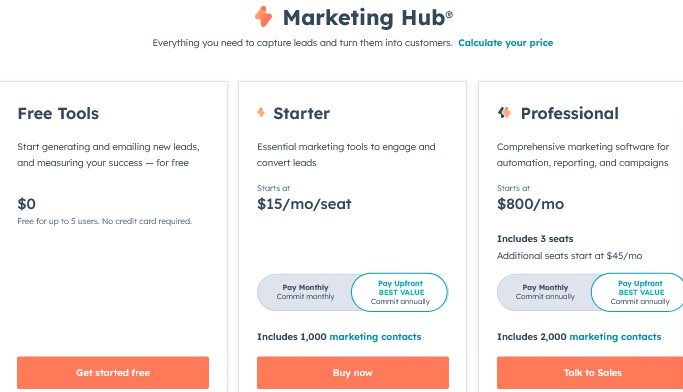
- Starter Plan: Affordable, essential CMS features for creating a simple, secure website with basic support.
- Price Range: Approximately $18-$50/month (billed annually).
Businesses & Enterprises:
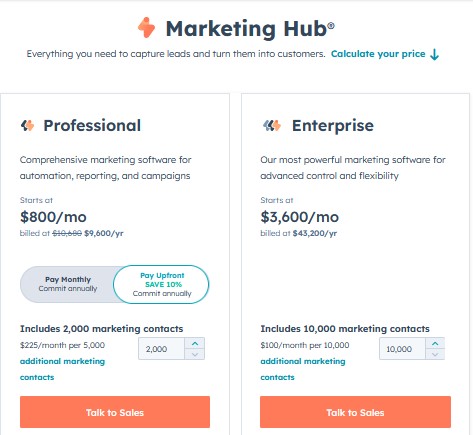
- Professional Plan: Advanced features and tools for growing businesses that need more customization and marketing tools.
- Price Range: Around $400-$800/month (billed annually).
- Enterprise Plan: Comprehensive solutions with enterprise-grade capabilities, dedicated support, and scalability for large organizations.
- Price Range: Starts at $1,200-$3,600/month (billed annually).
Pros and Cons:
One of the significant advantages of HubSpot CMS Hub as a best blog platform for affiliate marketing is its closed-loop analytics, giving you full visibility into how your content performs.
However, it’s worth noting that the platform’s extensive features come with a learning curve for newcomers to affiliate marketing or HubSpot’s ecosystem.
Criteria for Selecting the Best Platforms:
Buyer’s Guide When searching for the best blog platform for affiliate marketing, it’s essential to consider criteria such as ease of use, SEO capabilities, integration options, and the availability of marketing tools, all of which are areas where HubSpot excels.
Detailed Comparison:
A comparison between HubSpot CMS Hub and other best blog platforms for affiliate marketing reveals that HubSpot’s strengths lie in its integrated marketing features and comprehensive analytics, setting it apart from competitors that may require additional plugins or software.
HubSpot CMS Hub Setup Guide
- Sign Up for HubSpot CMS Hub
- Visit HubSpot’s website and choose CMS Hub.
- Select a pricing tier that suits your needs (Starter, Professional, or Enterprise).
- Sign up for an account by providing the necessary information.
- Explore the HubSpot Dashboard
- Familiarize yourself with the HubSpot dashboard.
- Access the CMS Hub section where you’ll manage your website’s content.
- Set Up Your Domain
- In your dashboard, navigate to the ‘Domains & URLs’ section.
- Connect your existing domain or purchase a new one through HubSpot.
- Choose or Create a Template
- Use HubSpot’s template marketplace to find a suitable design, or create a custom template using the drag-and-drop editor.
- Create Your Website Pages
- Go to the ‘Website Pages’ section in the CMS Hub.
- Start creating your pages using the templates you’ve chosen or created.
- Make sure to optimize each page for SEO with relevant keywords and meta descriptions.
- Add and Optimize Content
- Add text, images, and videos to your pages.
- Use HubSpot’s on-page SEO tools to ensure your content is optimized for search engines.
- Set Up Blogging
- If you plan to include a blog, use the ‘Blog’ tool to set it up.
- Customize the design to match your branding and optimize each blog post for SEO.
Conclusion/Summary (Best Blog Platform for Affiliate Marketing)
In our exploration of the best blogging platforms for affiliate marketing in 2025, we’ve identified five standout options, each with distinct advantages for different types of marketers:
- WordPress solidifies its position at the top, offering unparalleled customization through an extensive array of themes and plugins, perfect for those who want complete control and scalability in their affiliate endeavors.
- Squarespace claims the second spot with its visually stunning templates and user-friendly interface, making it ideal for marketers who emphasize design and want an all-in-one solution without a steep learning curve.
- Wix comes in third with its intuitive drag-and-drop builder, appealing to those who prioritize simplicity and speed in setting up their affiliate marketing site without needing deep technical skills.
- Shopify is fourth, favored by marketers who blend affiliate marketing with direct e-commerce, offering powerful tools to sell products and manage affiliate partnerships under one roof.
- HubSpot CMS Hub rounds out the list at fifth, bringing an integrated approach to content management and inbound marketing strategies, a boon for those who look to align their affiliate marketing efforts with a broader marketing ecosystem.
Each platform has carved out its niche: WordPress for its versatility, Squarespace for its design, Wix for its user-friendliness, Shopify for its e-commerce focus, and HubSpot CMS Hub for its comprehensive marketing suite.
Affiliates must weigh their specific needs—whether that’s design aesthetics, ease of use, customization depth, e-commerce capabilities, or integrated marketing tools—to make the most informed choice.




